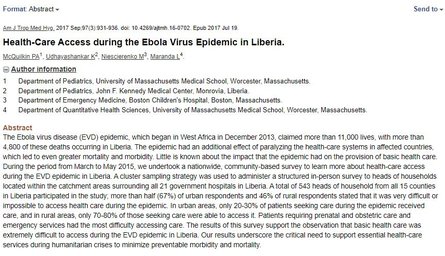
The Ebola virus disease (EVD) epidemic, which began in West Africa in December 2013, claimed more than 11,000 lives, with more than 4,800 of these deaths occurring in Liberia. The epidemic had an additional effect of paralyzing the health-care systems in affected countries, which led to even greater mortality and morbidity. Little is known about the impact that the epidemic had on the provision of basic health care. During the period from March to May 2015, we undertook a nationwide, community-based survey to learn more about health-care access during the EVD epidemic in Liberia. A cluster sampling strategy was used to administer a structured in-person survey to heads of households located within the catchment areas surrounding all 21 government hospitals in Liberia. A total of 543 heads of household from all 15 counties in Liberia participated in the study; more than half (67%) of urban respondents and 46% of rural respondents stated that it was very difficult or impossible to access health care during the epidemic. In urban areas, only 20-30% of patients seeking care during the epidemic received care, and in rural areas, only 70-80% of those seeking care were able to access it. Patients requiring prenatal and obstetric care and emergency services had the most difficulty accessing care. The results of this survey support the observation that basic health care was extremely difficult to access during the EVD epidemic in Liberia. Our results underscore the critical need to support essential health-care services during humanitarian crises to minimize preventable morbidity and mortality.
